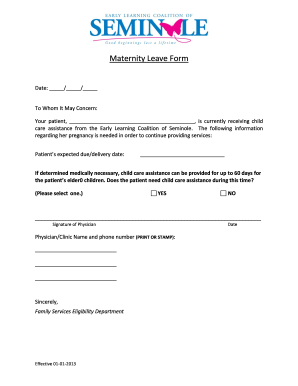When to Submit Maternity Leave Paperwork: A Clear Guide

Whether you're expecting a little bundle of joy or adopting a child, understanding when to submit your maternity leave paperwork is crucial for a smooth transition into this new chapter of life. This guide will walk you through the essential steps, timelines, and considerations you need to know to ensure your leave is seamless and well-coordinated.
Why Timely Submission of Maternity Leave Paperwork is Important

Before we delve into the specifics, it’s important to understand why the timing of your maternity leave application is so pivotal:
- Legal Requirements: Many countries have specific maternity leave laws that require employers to be notified in advance.
- Workplace Planning: Submitting your paperwork timely allows your employer to prepare for your absence and ensure your responsibilities are covered.
- Your Financial Well-being: Early application ensures there’s no delay in receiving maternity pay or other benefits.
When Should You Submit Maternity Leave Paperwork?

The timing for submitting your maternity leave paperwork can differ based on legal requirements, company policies, and personal circumstances. Here’s a general guideline:
| When? | What to Do? |
| As Soon as You Know | Inform your employer or HR department about your pregnancy or adoption plans. This allows for early planning. |
| By Week 25 of Pregnancy | In the UK, for example, you must provide a MATB1 form by this time. In other places, similar deadlines might apply. |
| 6-8 Weeks Before Leave | This is the typical deadline for notifying your employer about the start of your maternity leave. |
| Your Last Day of Work | Confirm the start of your maternity leave. This can be done in writing or through an agreed-upon method with your employer. |

Steps to Prepare Your Maternity Leave Paperwork

- Gather Information: Understand your company’s maternity leave policy, local laws, and the specifics of any maternity benefits you’re entitled to.
- Complete Required Forms: Fill out any forms necessary for maternity leave. This might include a notice to your employer, benefits application forms, etc.
- Medical Documentation: If your company requires, submit a medical certificate or similar proof of your pregnancy or adoption status.
- Discuss with Your HR: Schedule a meeting with HR to discuss your leave, return date, and how your work will be managed in your absence.
- Confirm Benefits: Ensure all benefits paperwork is submitted to secure your maternity pay or any other benefits.
📝 Note: Policies can vary greatly, so it’s crucial to discuss your situation with your HR department or review your employee handbook to understand the specific requirements of your workplace.
Common Scenarios That Require Special Attention

Sometimes, unexpected situations arise. Here’s how you should handle some common scenarios:
- Early or Late Deliveries: Adjust your leave dates with your employer if your delivery date changes significantly.
- High-Risk Pregnancy: If you have a high-risk pregnancy, inform your employer as early as possible to discuss your leave.
- Adoption: Similar to pregnancy, provide adoption paperwork well in advance of your expected leave start date.
👩🦰 Note: Always keep your employer informed of any changes or medical developments to ensure both your health and career are protected.
Summary

By now, you understand the importance of timely submission of your maternity leave paperwork. Following the suggested timelines, preparing your documentation, and communicating effectively with your HR department are key to a successful maternity leave experience. Remember, this process not only safeguards your rights but also ensures your workplace is well-prepared for your temporary departure.
What if I need to extend my maternity leave?

+
If you require an extension for your maternity leave, inform your employer as soon as possible. Discuss whether any unused vacation time or company policies can facilitate an extension.
Can I change my leave dates if I deliver early?

+
Yes, you can adjust your leave dates with your employer if you deliver earlier or later than expected. Early notification allows for better workplace planning.
Do I need to provide proof of pregnancy for my maternity leave application?

+
Yes, many employers require a medical certificate or MATB1 form as proof of pregnancy. This usually needs to be submitted at a specified time during your pregnancy.
What should I do if I face complications during my pregnancy?

+
Inform your HR department immediately about any complications. Your employer might offer additional leave or accommodations, depending on your medical needs and company policy.
How can I ensure my maternity pay is not delayed?

+
To prevent delays in your maternity pay, submit all required documents well before your leave starts. Discuss timelines with HR and ensure all paperwork is complete and accurate.